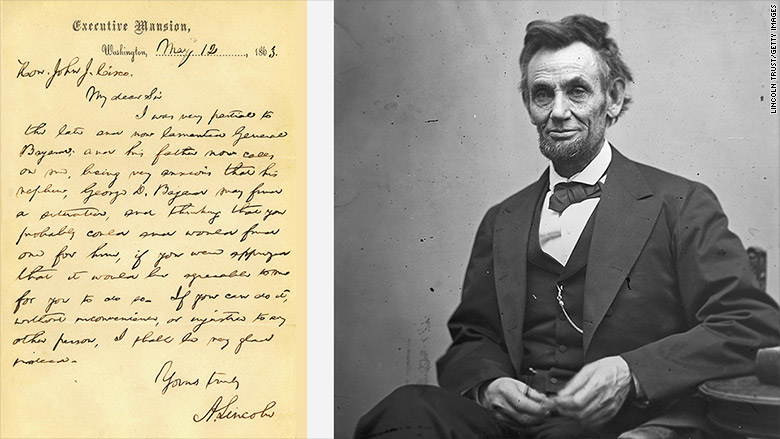
President Abraham Lincoln might win the prize for writing the most pleasant job recommendation letter ever.
In May of 1863, Lincoln wrote to a board member of U.S. Trust asking if the bank would hire a young man named George Bayard. (A full transcription of the letter appears at the end of this article.)
"If you can do it, without inconvenience, or injustice to any other person, I shall be very glad indeed," wrote Lincoln.
The letter is handwritten on the Executive Mansion stationery and signed "A. Lincoln." Unlike many recommendation letters today, Lincoln kept it short and didn't list out any of George's skills. Instead, Lincoln said he knew George's uncle, who had died in the Civil War.
Related: Looking for a better job? Try the Steve Jobs approach
U.S. Trust isn't sure if young George got the job. The company doesn't have complete HR records from that era.
The letter is on display in the office of Keith Banks, the president of U.S. Trust.
"It's the most eloquent way I'm aware of of asking if a young person can have a job," Banks told CNNMoney.
Founded in 1853, U.S. Trust worked with many prominent businesses and civic organizations in the 19th Century such as Standard Oil and the Metropolitan Museum of Art. John Stewart, the founder of U.S. Trust, served as Lincoln's Assistant Treasury Secretary.
Today, U.S. Trust is a unit of Bank of America (BAC) and manages money for high net worth clients.
While it's not illegal for a president to write a letter like this today, it would be frowned upon, says Richard Painter, a lawyer and former ethics counsel to President George W. Bush.
"Under the rules today, the president can do what he wants on the White House stationery" except solicit a bribe, says Painter.
Letters of recommendation are "thorny issues" for the executive office. Painter says the general rule in the White House now is to only use government stationery if it's clear that recommending someone for a position is in the U.S. government's interest.
Related: How New York's 1% get kids into preschool
Transcript of the Lincoln letter
May 12, 1863
Hon. John J. Cisco
My dear Sir
I was very partial to the late and now lamented General Bayard and his father now calls on me, being very anxious about his nephew, George D. Bayard may find a situation, and thinking that you probably could and would find one for him if you were apprized (sic) that it would be agreeable to me for you to do so. If you can do it, without inconvenience, or injustice to any other person, I shall be very glad indeed.
Yours truly
A. Lincoln.


